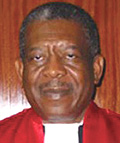The President of the International Criminal Tribunal for Rwanda (ICTR) Dennis Byron has called for increased cooperation between the court and national prosecution authorities.


The President of the International Criminal Tribunal for Rwanda (ICTR) Dennis Byron has called for increased cooperation between the court and national prosecution authorities.
Byron was yesterday addressing a forum that brought together representatives of different national prosecution services, and members of the civil society at the East African Hotel, Arusha Tanzania.
He described the forum as crucial, saying that it was essential in order to effectively close the impunity gap for international crimes especially at a time when the UN court is coming towards its closure.
"The tribunal depends on the continued assistance of member states to accomplish its mandate. Cooperation is required in many aspects including arrests of fugitives, possible transfer of cases, enforcement of sentences and relocation of acquitted persons and persons who have their sentences,” Byron said.
However, Byron underscored that the relation between national and international prosecution of international crimes is not a one-way street.
The ICTR President cautioned that national judicial authorities also can and should benefit from international justice systems and from the heritage they will leave behind.
ICTR Prosecutor Justice Hassan Bubakar Jallow, revealed that experience and the records of the ad hoc international tribunals and the pool of talent are at the disposal of national institutions.
The call for cooperation comes a few months after many analysts have described international justice as a myth where some countries use it to serve their interests at the expense of others.
Germany and France, among other UN member states, have been cited as showing little will in the promotion of international justice.
Germany recently freed two Genocide suspects Onesphore Rwabukombe and Callixte Mbarushimana who are wanted to answer for crimes committed in 1994.
Among other criminals living in Germany is Ignace Murwanashyaka, the leader of the Democratic Forces for the Liberation of Rwanda (FDLR), a rebel outfit made up of elements responsible for the 1994 Tutsi Genocide and operating in the Eastern Democratic Republic of Congo.
Ends


